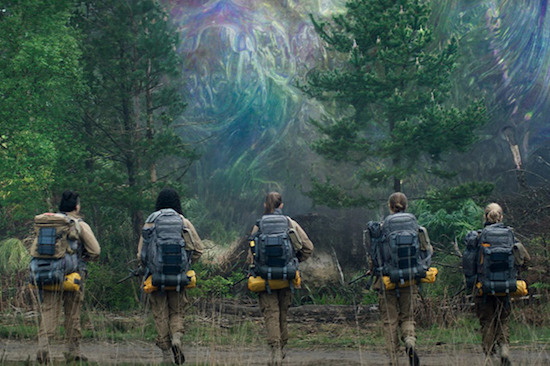“What did you eat?”
Observed and interrogated in a glass-walled, sterile room by faceless government agents and scientists in hazmat suits, Natalie Portman’s character Lena, a biologist, is asked that simple question.
“I don’t remember eating”, she responds with a sense of otherness and inhumanity, elevating herself from a seemingly vulnerable position into an inexplicable threat in the eyes of her captors.
The subdued tension and unfolding mystery of this cold opening amplifies the misguided expectation of cerebral impact that Annihilation was burdened with long before reaching its first viewers. Shunned by Paramount, director Alex Garland’s second proper movie (after the revered Ex Machina) was depicted as a difficult affair, one unsuitable for filmgoing audiences at large.
Yet the film starts with a frivolously familiar sequence of events. Something alien infects a patch of Earth and starts spreading. A team of scientists is sent to investigate this Area X or Shimmer. Bad things happen.
It’s a premise, distilled as it is in this adaptation of Jeff VanderMeer’s The Southern Reach trilogy, that Garland employs purely as an opportune mise en scène for another Jungian exploration of the human psyche – especially its dark and destructive splinters.
“Nothing comes back”, explains Jennifer Jason Leigh’s Ventress, with a weary voice, a psychologist and leader of the expedition. “The boundary’s getting bigger, it’s expanding”, she continues in conveniently expository fashion, emphasising the gravity of the situation as the Shimmer threatens to engulf the whole planet.
Even in light of a global cataclysmic event, Garland is only interested in its effects on the expedition team (which, aside from Lena and Ventress, includes an astrophysicist,Tessa Thompson, an anthropologist, Tuva Novotny, and a paramedic, Gina Rodriguez). These are all painfully flat characters, individually unimportant and reduced to stereotypes, serving in part as glorified redshirts and specimens on which the cruel and vicious effects of the Shimmer are demonstrated. But it’s their tacked-on emotional and physical scars that provide the real raison d’être: suicidal thoughts amidst an existential crisis, cancer, addiction, and unfathomable grief.
In contrast to the rest of ensemble, Portman’s protagonist is analysed in more detail. Even then, Lena is defined not as an individual, but rather exclusively through the prism of the relationship with her husband Kane, portrayed by Oscar Isaac. Harmfully interdependent and trapped in a feedback loop, they both end up entering the Shimmer to break free from oppressive routine, not in search of answers, but as a means of escape or redemption. Driven by obsessive motives, they are also the only ones to come back from their encounter with the otherworldly, in one form or another.
For Garland, these damaged characters are here to further drive a banal notion about nihilism and the impossibility of change that exists at the core of the film – an idea that might have fallen out of a self-help book. “Almost none of us commit suicide, almost all of us self-destruct”, Ventress enlightens Lena before embarking on the suicide mission. “Isn’t self-destruction coded into us? Programmed into each cell?”, she asks, not expecting an answer. And in Annihilation this destruction becomes manifest and all encompassing.
“I don’t know” is a phrase that, repeated numerous times by various characters, becomes almost an epistemological mantra directed at the viewers. Not everything is solvable and knowable, the film seems to say, some things are best left open to interpretation. Yet this attempt at communicating the metaphysical and the underlying emotional significance are greatly diminished by Annihilation’s overly explicit reliance on exposition sequences and lush, CGI-heavy visual cues.
The border that separates the Shimmer from the rest of the world thus appears as a huge, fluid dome with an iridescent surface not unlike a soap bubble. Its psychedelic colours and soft, diffused light infect everything under it and obtrusively emphasise the alien origin of the place – a world born out of an LSD-fuelled hallucination. Within it, the mutations of the flora and the fauna are similarly explicit and plentiful. “The Shimmer is a prism, but it refracts everything.” Bushes grow in the form of human beings, alligators have mouths filled with shark teeth, while flowers spring from antlers of mutated deer.
During one markedly poignant scene, a transmogrified and distorted creature that once might have been a bear calls to the surviving members of the expedition in the voice of one of their dead crewmates. It’s a thrilling scene, emerging from an inverted uncanny valley, that mirrors Ripley’s first encounter with the xenomorph in Alien³. Yet, beside being undeniably and immediately visceral, it helps trap Annihilation in an uncomfortable position somewhere between a creature feature, a body horror flick, and introspective melodrama.
Garland has just a few worthy points to make, culminating in Lena’s beautifully choreographed struggle with an extraterrestrial copy of herself, while the story and framework around those moments feels strained and loosely connected. One needs to look no further than a genre classic like Stalker or, more recently, Under the Skin for examples of films which manage to convey the sort of emotional and psychological message that Garland aims for, with far more elegance and intensity whilst still maintaining a masterful ambiguity.
Comparing the film with the source novels is pointless as Annihilation is, at best, loosely based on the original concept. While faithful adaptations are often a bad idea, the film manages to miss some of the novels’ most important themes. The existence of intriguing nods to the work of Michel Foucault and Bruno Latour’s writings on posthumanism, thoughts of voluntary human extinction, and a radical ecological manifesto that questions human exceptionalism are only briefly implied in the movie.
While Kane is replaced by his doppelgänger in the real world and Lena returns as herself, she has been irrevocably changed. A shimmer in both of their eyes during a final embrace closes the loop opened by the introductory scene and echoes with the same foreboding announcement of danger found in Ex Machina: something inhuman has been released into the world.
A fitting end, though a disappointingly conventional twist for a disappointingly conventional sci-fi film.
Annihilation is on Netflix



